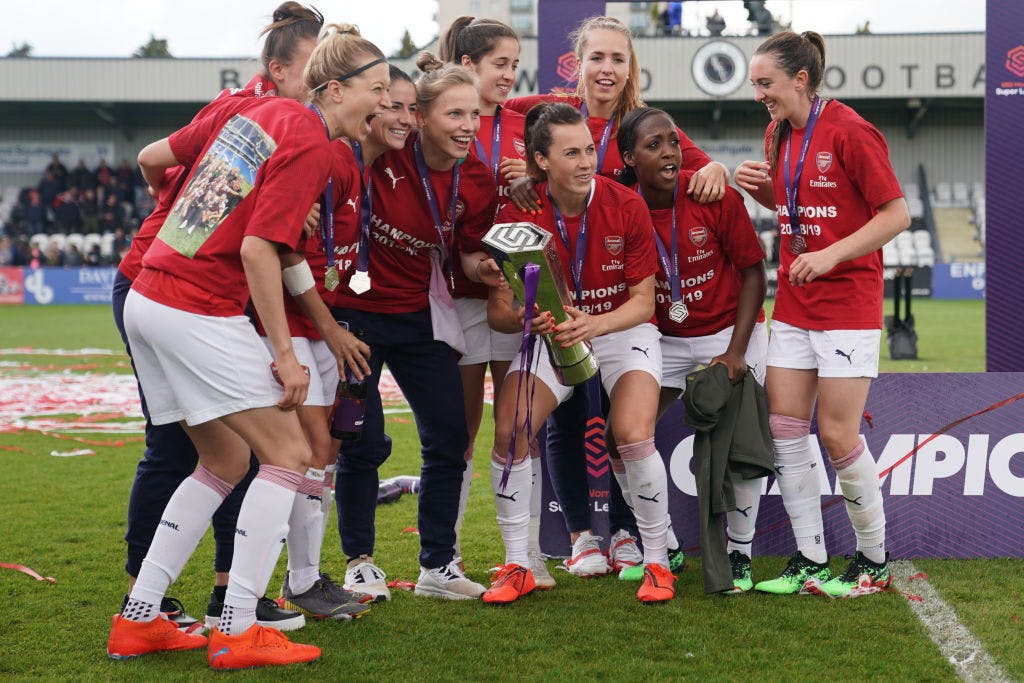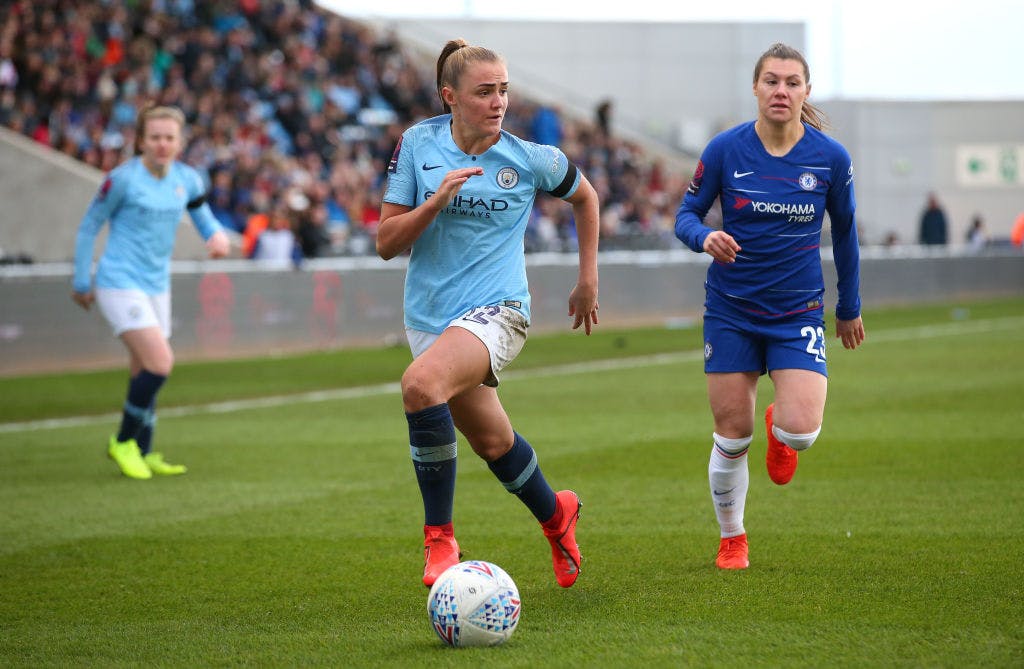Barclays bank will pay between £1.8m ($2.3m/€2m) per season as the first title sponsor of the FA Women’s Super League, SportBusiness Sponsorship has learned.
The overall £5.4m, three-year deal is the largest ever sponsorship investment in UK women’s sport and comes less than a year after the league went fully professional in September 2018.
The title sponsorship runs from July 2019 to July 2022, and will see the top-flight of women’s football in England renamed the ‘Barclays FA Women’s Super League’.
Under the deal, the bank also becomes the Lead Partner of the FA Girls’ Football Schools Partnerships – a player development scheme that will roll out in 100 hub locations across the UK.
This element of the partnership, which comes into immediate effect, follows a two-year pilot scheme.
Above the rights fee, Barclays is contractually committed to a marketing spend around girls and women’s football to help grow awareness, attendances and audience.
Inventory
Barclays, Title Sponsor, FA Women’s Super League, July 2019 to July 2022
- Title rights as the ‘Barclays FA Women’s Super League’
- Logo lock-up between Barclays and the FA Women’s Super League
- Branding on media and interview backdrops
- Allocation of perimeter advertising board inventory as per agreement with the clubs
- Contribution of £500,000 to annual prize fund for the league.
Barclays to become first title sponsor of The FA Women’s Super League with multimillion-pound partnership #BarclaysFAWSL
— The FA Women’s Super League (@FAWSL) 20 March 2019
Negotiations
It is understood that preliminary discussions on the deal took place between the Iris Worldwide agency, working on behalf of Barclays, and the Football Association.
Talks focused initially on the WSL title rights, but quickly progressed to include the FA Girls’ Football Schools Partnerships.
Leading up to the partnership, Iris also worked with Barclays to review all its sponsorships. Iris then partnered with Barclays to deliver the strategy, content and PR for the WSL.
Negotiations with Iris and Barclays crossed FA departments.
At various times, talks involved Mark Bullingham, formerly commercial director and now chief executive of the FA; Marzena Bogdanowicz, head of marketing and commercial for women’s football; Sara Hunter, commercial consultant for women’s football; Steve Adams, senior partnership sales manager for the FA; and Kelly Simmons, the FA’s director of the women’s professional game.
Tom Corbett, head of sponsorship and media at Barclays, signed off on the deal for the brand.
According to Simmons, sale of the title rights was just one option envisaged for the WSL sponsorship programme. “It depended who came in and what investment and commitment they were prepared to make, but once we started to talk to Barclays, we were very comfortable going down that route,” she said.
“We had some early discussions with other brands. But once Barclays came to the table, and we started to talk, it was clear that they had a similar level of ambition for the Women’s Super League as we did, and a level of investment that could really help transform the competition.”

“Opportunity makers”
Working with Iris, Barclays sought a sponsorship that would enable the brand to focus on its core message as ‘opportunity makers for people’.
“We are a company of opportunity makers working together to help people rise – customers, clients, colleagues and society,” the company stated in its 2018 annual report.
In pursuit of this corporate aim, Barclays expects to use its experience as a major sponsor of the English Premier League to help transform the women’s game in the UK.
In March, Barclays confirmed the extension of its current partnership as Official Banking Partner for the Premier League for another three seasons, from 2019-20 to 2021-22. The deal is worth about £10m per season.
Previously, the bank had been title sponsor of the Premier League: first in 2001-02, under its Barclaycard brand, and then – over multiple deals from 2004-05 to 2015-16 – under the Barclays master-brand.
“Diverse and inclusive”
A secondary benefit of the sponsorship aligns with Barclays’ ambitions for a diverse and inclusive workforce.
“Gender diversity, particularly at senior leadership levels within the organisation remains our focus,” the company stated in its 2018 report.
Previously, Barclays has partnered in football with Team Pride, set up by the charity Stonewall, and their Rainbow Laces campaign to promote equality for LGBT fans and players, and with Women in Football, a network of professionals working in UK football who support women in their football careers.
Activation
It is understood Barclays will be an active partner with the FA in the planning and delivery of the league’s marketing plans for next season.
SportBusiness Sponsorship understands that this will include a key launch period after the Fifa Women’s World Cup final in July and plans to leverage relations with the men’s game.
“We know that the women’s clubs are particularly ambitious around the Fifa men’s windows when the men are playing international games, so we can potentially put our games on in the big stadiums,” said Simmons.
“It’s about how can we really make some of those big games huge, like we’ve seen in Europe, with the 60,000 fans who watched Barcelona and Atlético Madrid.”
This season’s double-header between Manchester City and Chelsea, in which the women’s match preceded the men’s at the at the Etihad Stadium in Manchester, is another means to leverage the men’s game, Simmons said.

“It’s time to think through the calendar and plan and see where we can leverage the men’s game, creating potentially more double-headers with the men’s teams at clubs like Chelsea, Manchester City, Arsenal, West Ham and Liverpool – and from next season – Manchester United and possibly Tottenham Hotspur.”
Women’s FA Cup & League Cup
The FA’s next-most valuable sponsorship properties for the women’s club game are the Women’s FA Cup and the FA Women’s League Cup, currently title-sponsored by energy company SSE and tyre brand Continental respectively.
Both deals are up for renewal after this season, with SSE less likely to renew than Continental, according to industry sources
SSE is in the last year of a four-season deal with the FA, worth £675,000 per season and ending at the end of May. As part of the deal, the company also sponsors close to 1,250 SSE Wildcats Centres, where five to 11-year-old girls can play football on a weekly basis.
The next cycle is being marketed at an increased fee, in part because of enhanced media coverage of the competition’s semi-finals and final under a deal with UK public broadcaster the BBC, from 2021-22 to 2024-25. The deal includes distribution of highlight reels and short-form video content across BBC platforms.
The FA is also set to announce new plans for live coverage of other matches in the competition programme.
Continental is paying about £600,000 per season as title sponsor of the FA Women’s League Cup, in a deal that includes an official sponsorship with ‘The Lionesses’ – the England women’s national team.
This article was amended, October 11, 2022, to reflect new information on the title sponsorship rights fee.